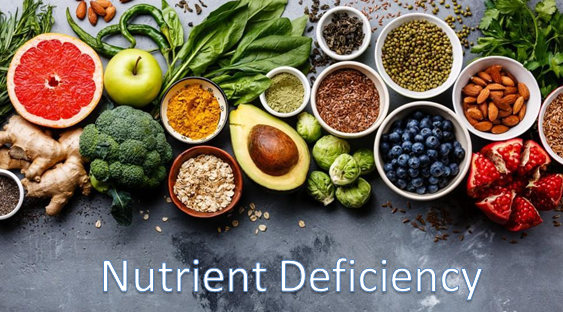Introduction
Have you been experiencing feelings of dwindling, forgetful, or just not yourself recently? There may be something significant your body is attempting to tell you. Nutrient deficits are frequently indicated by modest symptoms that are easy to miss. It’s time to pay attention to what your body is saying and use nutrition to address the underlying reason rather than dismissing them or covering them up with temporary solutions. Almost every bodily process, from generating energy to bolstering the immune system, depends on nutrients. Your body begins to exhibit symptoms when you are deficient in specific nutrients, some of which are more visible than others. The good news? Many of these issues can be resolved with simple dietary changes.
Exhaustion and Low Vitality
Iron and vitamin B12 deficiencies could be the cause.
Fix It Organically: among the most prevalent symptoms of iron and B12 insufficiency is fatigue. Iron facilitates the flow of oxygen across the body, whereas B12 encourages the production of red blood cells. Add foods high in iron, such as spinach, lentils, red meat, and fortified cereals. For B12, try eggs, milk and yogurt, and dietary yeast. Iron sources should be used with foods strong in vitamin C, like oranges or tomatoes, to enhance absorption. Vegans and vegetarians should focus especially on these nutrients.
Thinning or Loss of Hair
Potential Deficiency: Biotin or Zinc
Fix It Organically: Although hair loss might be upsetting, food is frequently the cause. Biotin fortifies hair strands, while zinc promotes the health of hair follicles. Add zinc-rich meals like sunflower seeds, nuts, and meat. Good sources of biotin include eggs, sweet potatoes, and whole grains. Hair health can be greatly improved by eating a diet high in protein and well-rounded.
Dry or Cracked Lips
Potential Shortcoming: Vitamin B2 (riboflavin)
Fix It Organically: Your riboflavin levels may be low if your lips peel or split easily, especially around the corners. Energy levels and healthy skin are maintained by this B vitamin. Green leafy vegetables, dairy, and mushrooms are excellent sources. To enhance your overall consumption of B vitamins, including eggs and almonds in your morning.
Forgetting and Brain Fog
B vitamins and omega-3 fatty acids may be deficient.
Fix It Organically: Deficits in nutrients that support the brain might cause feelings of mental fog or forgetfulness. The omega-3 fatty acids, that reduce inflammation and enhance cognitive function, are found in flaxseeds and fatty foods like salmon. B vitamins are necessary for nerve functioning and mental clarity, particularly B6, among other nutrients B9 (folate), and B12. Leafy greens, avocados, chickpeas, and whole grains are all great options.
Hand Weakness or Brittle Nails
Potential Deficit: Iron or Magnesium
Fix It Organically: Hand weakness and brittle nails may indicate an iron or magnesium shortage. More than 300 metabolic processes, including those involving muscles and nerves, are supported by magnesium. Eat more pumpkin seeds, lentils, spinach, as well as dark chocolate. Iron-rich foods include lean meats and fortified grains.
Recurrent infections or colds
Possible Vitamin C and D Deficiency
Fix It Organically: Your immune system may require assistance if you contract every illness that is going around. While vitamin D strengthens defenses against infections, vitamin C increases the creation of white blood cells. Eat a lot of kiwis, berries, bell peppers, and citrus fruits. Incorporate mushrooms, fatty salmon, and enriched milk products into your diet, and spend time outside in a safe manner to receive sunlight (vitamin D).
Spasms or cramps in the muscles
Potential Shortcoming: Magnesium or Potassium
Fix It Organically: An imbalance of electrolytes or low magnesium levels may be the cause of sudden muscular cramps, particularly in the legs. Leafy greens, yogurt, sweet potatoes, bananas, and avocados can all help keep muscles functioning properly and avoid cramping.
When to Consult a Physician
Many deficiencies can be corrected by nutrition, however certain symptoms might not go away because of underlying medical conditions. See a doctor if dietary adjustments don’t help with symptoms including exhaustion, memory problems, or other symptoms. Deficits may be verified by blood tests, and prescription supplements may be necessary.
Conclusion
Before your body yells, it talks in whispers. Making dietary adjustments that promote your energy, mood, attractiveness, and general wellness can be facilitated by being aware of these early indicators of vitamin shortages. Eat the rainbow, choose complete foods, and provide your body with the natural nourishment it needs to flourish. Keep in mind that being healthy means feeling your finest every day, not only avoiding sickness.
